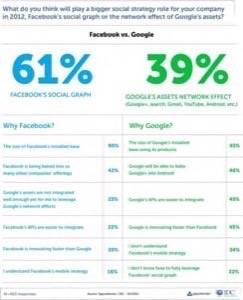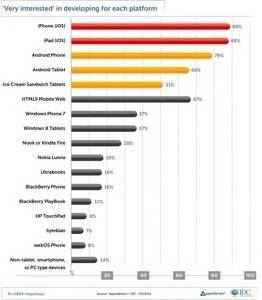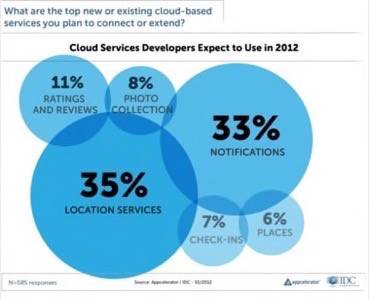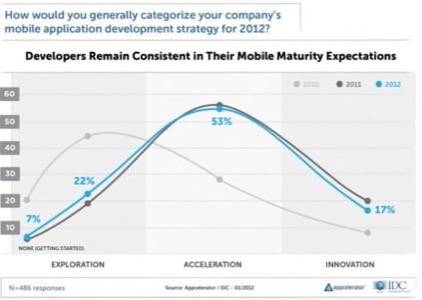

Google and Facebook are in a war for user attention on the Web. This is not just about how many eyeballs are on Google+ versus Facebook but also from an end-to-end platform perspective. That includes messaging, application deployment, social graph implementations and content discovery. Like everything else in the world of technology, this battle is going mobile. When it comes down to developing social mobile applications, Google may be doing better than many people think.
In Appcelerator and IDC’s quarterly report on the trends of the mobile industry, 39% of developers answered that Google’s total assets were more important to them than Facebook’s social graph. Considering the huge lead that Facebook has in the social space, this is a bit of a coup for Google. What else are developers interested in at the start of 2012? HTML5 is on the rise, cloud services are hot and developer interest in Android is dwindling.
Google’s Big Bite out of Facebook
Developer interest in Google’s social properties actually has little to do with Google+, the search giant’s erstwhile social platform. It really has to do with Google’s network effects, the total assets that the company brings to the table in comparison to Facebook’s social graph. When you think of it as an end-to-end platform, it makes a lot of sense. Google has search, YouTube, Gmail, Google Maps, Android Market, Google Play, Docs, AdMob and Google+. Facebook has the social graph and the Open Graph, a ton of user data, an advertising platform (except not for mobile) and 425 million mobile users.

34% of respondents said that they did not fully understand Facebook’s mobile strategy, a damning response against the social platform that has not been fully addressed by the company as it prepares for its initial public offering. To be fair, 61% of developers still have more interest in Facebook social mobile apps than Google, but 90% of respondents said that was because of the platform’s enormous installed user base.
“What they [Google] have done is explain the connections between different properties much better than Facebook has, that is really what our developers were circling around,” said Appcelerator’s principal mobile strategist Mike King, a former Gartner mobile analyst.
Fragmented Android Takes A Dip
Google and Android are activating more devices than ever before. So, how can Appcelerator see a dip in interest by developers creating apps for the platform? It is simple: they are sick of Android’s fragmentation issues.
This is a matter of device and platform fragmentation, but also one of ecosystem. As an Android developer, ask yourself: how do you make money? You do not really have a single good answer for that question, do you? Is it advertising? Is it in-app purchases? Is it a little bit of all of the above? While Monty Brewster would be proud of you, it is a difficult way to go about running a business.
“They have been talking about doing it for a while but developers are getting a little tired of the story without anything delivered. What we see is just a slow chipping away of interest level on Android,” King said. “It is fragmentation not just at the device level but also fragmentation of the marketplace and ecosystem. There is no single good way for an Android developer to make a lot of money. They have to pursue a lot of different strategies.”
This does not bode well for Google chairman Eric Schmidt’s prediction that developer interest in Android will eventually eclipse iOS in 2012. That is just not going to happen especially as actual smartphones running Android 4.0 are few and far between (no major carrier outside of Verizon sells an ICS device as of now). Developer interest in Android smartphones fell about 5% from Q4’s survey.
We will see how this plays out. When tracking developer interests there are always a few fluctuations from quarter to quarter. Have developers found a comfort level with their Gingerbread implementations are and waiting for groundswell of ICS to develop to peak interest? That is going to take a while.

HTML5: Not Going Anywhere
Are app developers choosing to shun HTML5? Certainly not.
Appcelerator’s data shows that many developers are looking to HTML5 for a good portion of their apps. About 79% of developers in the survey said that they plan to integrate some HTML5 into their mobile apps this year. Yet, these are not going to be pure-play HTML5 mobile Web apps. When asked what percentage of HTML5 code would end up in their apps, the average developer responded less than 50%. That means that the era of the hybrid app will only grow through 2012.
When King and I discussed the nature of HTML5 versus native development, we likened it to building a house. There are different tools for different tasks. Choosing where and when to deploy HTML5 is like picking a hammer or a screwdriver out of a toolbox. Sometimes it is the appropriate tool for the job, sometimes not. The survey noted that only 6% of developers will write their entire apps in HTML5 while 72% see some type of hybrid and 22% will go fully native.

“It really does point to this multi-architectural strategy and developers really seem to agree with that,” King said. “It is a mobile platform-based approach. Picking a platform does not mean picking an architecture. So, you do not have to make a decision between HTML and native apps but rather is it a decision that every developer makes.”
Hello: Cloud
Appcelerator acquired mobile cloud services platform Cocoafish in January and the survey results point to it being a good bet.
“60% of our developers said that they were very interested in using cloud services in their mobile applications and location and notification were the top two services that they were interested in integrating into their applications,” King said. “That was just kind of a ‘nice, we got that right,’ moment for us.”

That bodes well for the startup community working on “backend-as-a-service” platforms like StackMob, Parse and Kinvey. Appcelerator realized this when it went out and acquired Cocoafish and will make most of the platform’s functionality available through various channels later in the year.
Maturation in Mobile: This Year’s Big Trend
Mobile developers are on a roll these days. They finally fully understand the platforms, the options, the tools and the limitations of the mobile ecosystem. Developers are no longer in the “exploration” phase of mobile development and have moved to the “acceleration” phase. They expect to be developing multiple applications across several platforms and having their efforts rewarded.
We have seen a lot of corollary data that proves that point. For instance, January was one of the biggest months for downloads on iOS even after peak download rates during the holiday season. There are simply more smartphones and tablets in the hands of more consumers and mobile developers are learning to meet their demands.

A note on the Appcelerator/IDC results: 2,173 Appcelerator Titanium developers were surveyed from Jan. 25-27, 2012. Follow-up surveys were done with 484 respondents between Feb. 12-23. While Titanium developers are a particular subset of mobile app developers, the size of the survey and results are usually indicative of the ecosystem at large.









